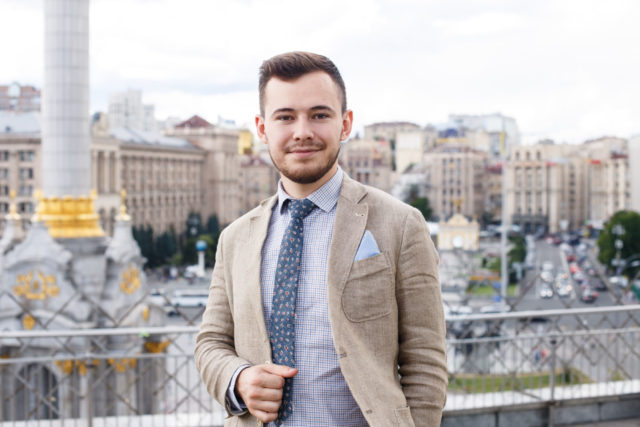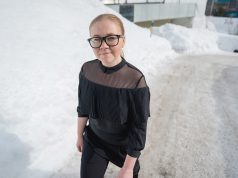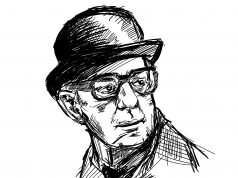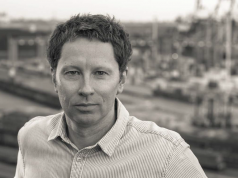Over the course of the events of the past three years, as the democratic situation in Russia has degraded numerous Russians have relocated to Ukraine. Increased pressure on those who disagree with the Kremlin’s policy, a resurgence of nationalism and isolationism, and just a simple discomfort to live in an aggressive undemocratic environment forced an enormous number of Russians to leave the country. The Odessa Review speaks with Grigory Frolov of the Free Russia Foundation about the EmigRussia project. The EmigRussia is a project missioned to help Russian political emigrants and asylum seekers become legalized in Ukraine and become a part of Ukrainian society.
Since the return of Vladimir Putin to the Kremlin, Russia is seeing a large new wave of emigration. People have been leaving Russia for many years in several waves, but this current one is different in that it is organized. People who leave Russia right now are often the bright and creative, and represents the class of the people who care about such European values and rule of law, human rights and free market. This people are leaving because they simply don’t see a future for their families under current Kremlin’s regime.
There has never before existed such an influential Russian diaspora, and we at the Free Russia Foundation in Washington, together with our colleagues from the Boris Nemtsov Foundation for Freedom, the association For Free Russia in Warsaw as as people in Brussels, Berlin, Paris and the Scandinavian countries, we are building a community for re-creating a democratic Russia. We have an age of the massive construction of a strong Russian diaspora abroad right now.
Russians go to other countries because of political persecution and because of the atmosphere of fear and a lack of freedom in Russia. While some Russian political emigrants are moving further to the West, many of Russians see Kyiv as the most ideologically appropriate and economically affordable place to move to. For many political emigrants with limited funds, without knowledge of a foreign language or relatives in the West, Ukraine has become the only possible direction to flee. However, after their emigration, people face numerous problems with issues of legalization, adaptation, and integration into Ukrainian society.
Ukraine has seen a huge wave of Russian Emigration primarily because it is a country which is very close in terms of culture to Russia, where one can speak Russian. It is easy to reach the border for educated middle class people who are part of a movement for a better society. A society in which there is no place for the current Kremlin regime. These Russians are able to build a community and an infrastructure for emigrants so they do not only or just have to become French or American, but can also remain Russian. That they can stay Russian and influence the situation back home. For example, there is the Ukrainian diaspora, which had a big influence on the adoption of the Ukrainian Freedom Act in the United States. Our project’s mission is to provide structure and support to a similar movement, and to help people settle their living status here, to become legalized and thus become part of a community. A community of Russians who are making a communal effort for the ‘offshore’ development of Russian democracy.
Of course, Russian people are moving to Ukraine for different reasons. Some of them because of the political repressions – they have to leave or go to jail. Some believed in Maidan, the Revolution of Dignity, and they feel their place is here because if they were not able to build a better Russia, they become part of the change in Ukraine. Others are moving here to work on implementing projects, creating businesses, taking part in reforms and so they become a positive influence.
After a month of working on our project, after hundreds of talks and hearing different opinions, it’s easy to see that there are two visions of Ukraine right now from the point of view of the local people. The first vision is that Ukraine should become a melting pot of the post-Soviet territory. That is a vision of bringing together people who now live under repression, but could move here to impact the future of Ukraine so it can become the freest and most economically developed country of the region. The other point of view is that Ukraine should become a country for Ukrainians. It doesn’t mean that people who think like this feel that Ukraine should not evolve or become more developed, but it is a different philosophical approach. I believe, it’s impossible to build a more European kind of country without multiculturalism, open markets, and the efforts of the best specialists. There is a need for qualified people in Ukraine because there are so many good projects here, but it will never be filled up if the country is not open to people from abroad. For the last 20 years, Russia was the richest country in the region and specialists from the other former Soviet republics were moving there to work in the Moscow offices of giant Western companies. That trend is changing, because the Russian economy is in decline and many feel that Moscow is no longer the best place to live. Kyiv could be however if it was easy enough to move here!
Regarding legalization issues, we distinguish between two groups of people. The first is refugees, and Ukraine is a very bad country for refugees right now. In the last two years, there have been 300 applications from Russians for refugee status in Ukraine and less than 10 percent of them were successful. The numbers for refugees from other countries aren’t much better. The migration system doesn’t seem to work very well in this situation. We have seen several cases of people who were denied refugee status, and in one case, the official letter from the migration agency said that it was denied because Russia is a democratic country where political repressions do not, and persecution does not exist. If you have multiple fines for participation in mass rallies or public demonstrations, that means you are a hooligan and Ukraine doesn’t need hooligans here. That was the actual answer in the case of the Russian asylum seeker Alexey Vetrov, who as of now hasn’t received refugee status, has lost all his court instances, and is now staying here without any rights.
There is the well known case of Peter Lubchenkov, one of the most public, and also one of the most ridiculous cases. He was one of the three key organizers of the March for the Federalization of Kuban. When the war in Eastern Ukraine began and there was a lot of public propaganda on Russian state TV saying that Ukraine should be federalized because of the interests of local Russian communities, many activists in Russia responded that maybe first we should make Russia into a real federation. Several groups, in Siberia, Novosibirsk, Nizhny Novgorod, and Kuban were organizing marches for federalization. These marches were prohibited by the local authorities, and in the case of Kuban, one organizer was prosecuted as an extremist and is now serving a two year sentence. The two others are in Ukraine, one of them was granted political asylum, and the third is Lubchenkov. He has been in the process of getting political asylum for a few years now. It was repeatedly denied to him as several times the Ukrainian court ruled to take his case back to migration authorities, to be denied again. There is a number of people living in such a situation right now. Just recently the higher court ruled that the migration authority must give asylum to Lubchenkov, but this the first such resolution of a case related to a Russian citizen that we have seen in the last couple of years.
Another example is that of Sergey Anisiforov, who is supposed to receive yet another answer from migration authority after several attempts, and he is not expected to get a positive response. This man is a Russian with some Ukrainian roots, either his father or mother is Ukrainian. He moved to Ukraine before the Maidan, seeking to become legalized under the law which provides this possibility for people of Ukrainian origin. When the Maidan happened, he participated in it from the beginning to the very end, and as a result lost out on the legal deadlines for his application. He received a medal from the Ukrainian Orthodox Church for his love for Ukraine, yet he is not able to get political asylum here.
We understand that there are some concerns in Ukrainian society about Russians who move here as an issue of national security. Of course we totally agree that Ukrainian secret services should make thorough background checks. We are aware of what is happening between our countries right now, that the Russian FSB is doing a lot of work, so there is no reason for the Ukrainian authorities to not to do that work. But for people who have been fully checked out, who have documented proof of political persecution from respected human rights organizations in Russia, there is no reason why they shouldn’t receive asylum here. I don’t know if we should address this question to the chief of the State Migration Service or to someone else, but what I know for sure, and what my Ukrainian colleagues working with refugees would surely agree on, is that the law on refugees in Ukraine is not being processed very well.
There is another group of Russians who move here and don’t have any political prosecution, but are making that choice because of their political and ideological views. That is because they want to live in a freer society, or because they believe in Ukraine. For this group, there are laws that provide legal status to people who have Ukrainian relatives, who work in Ukraine as volunteers or have a permanent job here. There is a procedure for this, but it’s not complicated to obtain permanent residency or citizenship if you know how it works. In those cases, we are providing assistance, such as the public step by step instructions on our website. We receive dozens of inquiries from people still living in Russia, or those already in Ukraine, in regard to certain steps in this procedure. We’re advising them on what to do, how to stay legal, how not to miss the deadlines, how to find proof and documents for some specific issues. Some of these issues are very specific indeed. Let’s say my grandmother has a different surname from me. To prove that she is my grandmother, I have to show my birth certificate, my mother’s birth certificate, the certificate of the marriage between my mother and my father, and my grandmother’s birthday certificate. You have to present all these original documents to the Ukrainian immigration authority, but even if someone doesn’t have all the originals, that is still solvable.
Here I should mention another important issue which was extremely surprising for me — that Ukrainians in many cases don’t really understand what’s happening in Russia. We have received a lot of support from people who understand the political realities and the human rights situation in Russia, who are looking at this issue from the multicultural and pro-European point of view. But we also have seen a lot of local concern about who these Russian refugees are, doubts that they had been in any actual danger or subjected to any persecution. Obviously, I know that there are many people who have been jailed, killed, and living in fear in Russia because of their political views, but I just recently figured out why there is this misconception. Vladimir Putin’s propaganda machine, the product which they made for Russia and the entire world, is horrifying to many Ukrainians, but also kills any interest in the actual events that are taking place in Russia. Every piece of news includes some kind of made up or ridiculous story or maybe a bit of news from the moon, so Ukraine lost interest and in many ways became more isolated from Russia.
Many people ask me, what is the first thing Russians should understand when they move to Ukraine? The answer to that question is that they should behave here like they have moved to a foreign country. Many Russians don’t realize that they are moving to a different society with different rules. The first thing that makes and unites a country is its political agenda, and for me it is becoming clear that the social and political agendas in Ukraine and Russia right now are completely different. Of course, we have the occupation of Crimea and the war in Donbas, so the only things which are uniting us are horrifying, and Russians don’t know what’s happening in Ukraine besides it. On the other hand, Ukrainians don’t pay attention to what is happening in Russia apart from the conflict, and they don’t understand that Russians who move here do so out of fear, because of the possibility of criminal prosecution, or even of physical abuse.
It’s very important to remember that not all of Russians are or like Putin, and Putin is not Russia, and is not representative of Russia. I believe that insight is going to become a very big part of our mission in Ukraine – speaking to people, providing more information, showing why Russians move here. Putin is the wall in our path on our way to a better future, standing not only in front of the Russian people, but in front of the Ukrainians as well. Many people in Russia are working towards democracy and justice, including justice for Ukrainian Crimea and for the Donbas. Ukrainians need such allies on the international stage and in the region, and we want to show that they do have such allies, they are still with them, but they also need their support. Russian activists need to have some safe harbor available close to home, so that they can fight up to the most dangerous moment, and know that if something happens, they can always move to Ukraine.
A lot of people would say: first you should bring back Crimea, second you should take back all of the military from Donbas, and then we can talk about how we can become allies. But working for a common cause, for democracy and freedoms, for the economic development and stability of the region, could also become a common ground for Ukraine and pro-democracy Russians right now.
More than a year ago, a bill went up to the Rada, one that focused on simplifying migration conditions for Russians who were fighting in the Ukrainian military forces or volunteer battalions and who were criminally prosecuted because of their public support of Ukraine. Yet after going through the first hearing it stalled and we are not sure why. A year ago, President Poroshenko gave out Ukrainian passports to several Russians, like Maria Gaidar and Katerina Sergotskova, and publicly stated that Ukraine will help pro-democratic Russians. Recently, Katerina together with some Ukrainian colleagues from the center Socialna Diya and the No Borders project submitted a petition to President Poroshenko about keeping his word in this regard. We are now on a long process of advocacy and negotiation for making the procedure of receiving refugee status and resident permits more clear and transparent. There is already a law on refugees in Ukraine, and the only problem is that the State Migration Service is not following it.
In terms of advocacy, the issues can be divided into two parts. The first one is one of defining a clear procedure, and the second is to gain the Ukrainian people’s support for this issue. There will be no political will on the issue of refugees until there is clear public support for it. This is a complicated and important effort, and a long term mission of the project. We need to tell the stories of the Russian people who are coming here because of political persecution or to make a positive impact on the development of the country, and we need to communicate with all the actors in this ‘market’: the government, the Ministry of Foreign affairs, the Migration Authority.
We are guests here, and it is not a part of our mission to influence state policies. We want to establish a kind of green corridor, helping the people and the authorities make the process work smoothly. For background checks, we have our colleagues in Russia, organizations like Memorial who have records of political persecutions in Russia and can provide information that a person is a victim of the Russian regime. We are ready to talk with migration officers to find out about the general standards for processing requests, and what information people usually fail to provide. Sometimes people come into the immigration authority without any paperwork at all, which can happen to political activists in Russia who leave the country urgently. If someone does dangerous work, it is advisable to keep papers with you, or on a cloud. This is simple advice, but it is part of the general work of this project.
So first of all, EmigRussia is a service for facilitating the migration process. Secondly, EmigRussia is a project about the dialogue between pro-democracy Russians and Ukrainians. In the future our countries may choose different ways to live — it’s the right of nations to self-identify. But at Free Russia, we believe that we need to work together to gain stability for the whole region which would lead to sustainable democracy for all of us.





































Pingback: House of Free Russia – Kyiv | Odessablog's Blog()
Pingback: House of Free Russia - Kyiv - OdessaTalk()